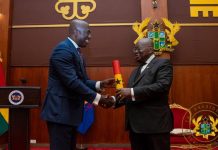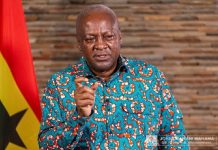The University of Ghana has launched a new four-year Bachelor of Education curriculum aimed at transforming Ghanaian schools into stimulating environments and to give the opportunity to every learner to develop their full potential.
The curriculum, which is under the School of Education and Leadership, College of Education, focuses on creativity, mathematics, science and technology and the development of transferable skills and desire for life-long learning for all learners.
As a result of the new course, six Colleges of Education will be affiliated to the University.
They are Accra College of Education, Enchi College of Education in the Western Region, Evangelical Presbyterian College of Education and Peki College of Education in the Volta Region, Gbewaa College of Education in the Upper East Region, and Mount Mary College of Education in the Eastern Region.
A speech read on behalf of Professor Ebenezer Oduro Owusu, the Vice-Chancellor of the University of Ghana, said the United Nations Sustainable Development Goal 4 sought to ensure inclusive and equitable quality education and promote life-long learning opportunities for all.
This, according to the Vice-Chancellor, involved preparing and equipping all with the relevant 21st Century education and productive skills to achieve the desired goal.
“The 21st Century curriculum demands that teachers exhibit compassion, love, kindness, empathy, patience, grit, perseverance and respect for learners in their work. Such teachers ought to have passion for teaching and a genuine belief in every child’s ability to succeed,” he added.
He said one of the reasons cited for the poor performance of students in developing countries was that although most initial teacher education programmes had outlived their usefulness, they have not been reformed for decades in line with modern trends of knowledge and skills acquisition.
Prof Owusu said the country’s new pre-tertiary curriculum called for changes in the three-year basic teacher education curriculum, adding that the Ministry of Education had introduced a new rigorous and practical focused high-quality degree programme to expose learners to practical teaching methodology.
He said the new curriculum would set a standard for learners to demonstrate the competencies required in the 21st Century classroom and raise the status of the teaching profession and make it more attractive to new entrants.
Mr Akwasi Addae Boahene, the Chief Technical Advisor, Transforming Teacher Education and Learning (T-TEL) programme, giving background to the curriculum, said the government in collaboration with Cambridge Education designed the six-year (2014-2020) T-TEL programme to transform teacher education.
He said the programme had initiated a national policy dialogue on teacher education, which led to the production of National Teachers’ Standards and the National Teacher Education Curriculum Framework (NTECF), approved by Cabinet in September 2017.
Mr Boahene said the September 2017 Cabinet Memorandum decreed that all basic school teachers would have to study and attain a Bachelor of Education degree aligned to the NTECF and delivered by the 46 Colleges of Education in the country.
He explained that, following the degree, a team of 105 Ghanaian educators from four Universities and Colleges of Education collaborated to write the Bachelor of Education curriculum, which was approved by the National Accreditation Board in July 2018.
Mr Boahene said the features of the Bachelor of Education curriculum include progress in student-teacher learning and skill acquisition, integration of subject-specific content and pedagogy and assessment of trainees.
He said the Universities’ role was to offer faculty, assessment and Certification, as well as staff capacity building services to the Colleges of Education.
Mr Felix Nyarko-Pong, Chairman of Advisory Board, College of Education of the University of Ghana, said it was the expectation that the University would mentor the Colleges and offer effective guidance to deliver quality education.
GNA
























